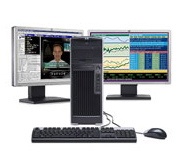
It is said that "A picture is worth a thousand words". How true. The ultimate goal of scientific visualization is to provide scientists with tools that permit them to analyze their data, extract information/features, correlate that information, and display their data in a meaningful way. More importantly, visualization encourages the scientists to ask questions. The more interactive an application, the more questions a scientist can pose. Application areas with large scale datasets (steady or time-dependent) include oceanography, study of hurricanes, data assimilation techniques, phylogenetic tree evolution, geophysics, fluid dynamics, and more.
The visualization laboratory is a DSC facility available for the use of researchers across the entire Florida State University Campus. Use is divided into the following categories:
Applications
The laboratory is open to all researchers of Florida State University who have a need to visualize and analyze their simulation or other data. Be sure to check out the tutorial section of this web site.
This access can take several forms:
- Work within the visualization lab, making use of dual large screens for maximum flexibility during the generation and rendering of large scale imagery and the generation of sophisticated animations. User data resides on our local 12 TByte storage facility.
- Remote access to the visualization laboratory from desktop computers or workstations. Typically this involves remote SSH connections and X-Window tunneling to run applications on the visualization machines from another location--this does not fully support hardware based graphics. During the coming months the Vis Lab will be testing innovative new software from HP, which allows users to execute any software that runs locally from a remote desktop Linux or windows machine in full graphics mode. As in the first case, data would be stored on our local file system for maximum efficiency.
Education
Perhaps most importantly, visualization is an integral component of the workflow adopted by researchers around the world. Visualization is necessary to
- construct computational grids that discretize the physical domain,
- check data for accuracy, correctness
- analyze simulation data
- extract features from simulation data
- ask questions of the data
Research
Scientists are encourage to use the laboratory for advanced research in the area of scientific visualization. Areas of interest include
and more ...

